Quick Links
Depending on where your dental practice is located, you’re competing with tens of other dentists for patients. So, how do you ensure patients find your clinic first or choose to avail of your services over your competitors? Search Engine Optimization (SEO) is the answer.
SEO for dentists has become essential in a world where most users look for answers online, including for search queries like “dentists in [AREA]” or “dentist near me.”
Most dentists have no clue about dental SEO since their primary focus is on patient care rather than marketing expertise.
To help dentists understand SEO, we’ve prepared a handy guide that covers all the important points, including a primer on SEO, signs you need it, and SEO best practices for your dental website.
What Is Dental SEO?
Search Engine Optimization (SEO) is the process of improving your website content to achieve higher rankings on relevant search engine results pages (SERPs).
When a patient searches for the term “San Jose dentist” or “dentist near me” on Google, the search engine lists several clinics. Here’s an example:
Ideally, when you do this search for your area or city, your clinic appears within the first few results. If not, dental SEO can take you there, and bring in more patients as a result.
There are three key core SEO components – on-page, off-page, and technical.
SEO for a dental website might start with updating on-page elements, such as the web page copy, optimizing content for specific target keywords, fixing meta tags, and altering URL slugs to boost organic search rankings
It also includes technical optimization, where the SEO specialist makes sure your website has the right architecture, loads quickly, is mobile-friendly, and is crawlable by search engines.
Off-page SEO refers to anything done away from your website to boost search rankings. It involves guest posting, social media promotion, and building backlinks.
Given all these elements, SEO for dental websites can take time. Exactly how much time depends on the required optimizations and your dental marketing strategy.
Why Is SEO Important for Dentists?
Dentists don’t always prioritize SEO for a variety of reasons. For one, it’s well outside their field of expertise, and many don’t understand its benefits. To show why it’s worth investing in, we’ve highlighted some benefits below:
Rank higher in SERPs
You may not know it, but search engine rankings are crucial if you want more patients. When users look for a dentist, they are much more likely to pick one of the top search results instead of one at the bottom or another page entirely. (In fact, the first result gets 11.4x more clicks than the 10th result.)
So, you need to rank on the first page and, ideally, within the top three. SEO, and in particular Local SEO, can help you get a piece of the pie.
Boost website traffic
When you rank high in search results, users looking for dental services can find you easily. So, you get more visitors to your website. This boosts your lead generation rates, meaning there are more opportunities for you to turn visitors into prospective patients.
Build credibility
Being among the top search results also adds to your credibility. It acts as social proof of your expertise since a typical patient assumes that the top results must provide excellent treatment. It lets potential patients know that they can trust your dental practice.
Improve your website’s user experience
An SEO audit will also expose any flaws on your website that negatively impact your user experience. For example, an audit can reveal that your website is hard to navigate on mobile or loads slowly. These factors turn potential customers away from your practice, even after they land on your site.
Get more patients
The higher your search ranking, the easier it is for new dental patients to find you. Ranking at the top of “dentist near me” or “dentist in [AREA]” search terms will drastically boost traffic since everyone that is searching for these terms will see your website first, over that of your competitors.
On-Page SEO Factors For Dentists
SEO strategies vary depending on the company, competitors, and industry. But, there are a few vital universal considerations for dental SEO. Onsite SEO makes your website more search engine friendly. Search engines “crawl” through your website content to collect data and determine if your page is credible.
The more detailed and precise your information is, the greater the chances of a high ranking. The most critical onsite SEO components are:
Keyword research & usage
A keyword is a word or phrase that indicates what a user is looking for on a search engine. Relevant dental search terms could just be one or two words like “dentist” (a short-tail keyword), or a phrase like “best dentist in [AREA]” or “painless retainers in [AREA]” (long-tail keywords).
Your SEO strategy should involve keyword research that identifies the best terms to target for your clinic and indicates how you can rank for these terms.
Once you have found a target keyword, you need to use it and related semantic keywords within your web copy, meta titles, meta descriptions, headers, and more.
Header hierarchy
Headings within your content help search engines understand the structure and relevancy of each section of a web page or blog.
Your headings must be logically arranged. Typically, Your H1 is the title, H2s cover the most critical topics, and H3s act as sub-headings under the H2s. You could also use H4s for minor sub-topics. This hierarchy also helps readers quickly scan the page and easily find the content they’re looking for.
Internal links
Adding links to related content, service pages, and products in your blog posts and landing pages leads users from one topic to another, keeping them on your website for longer and leading them closer to booking an appointment.
External links
Linking to third-party, high-authority sources shows readers that your information is well-sourced and credible. Citing data to back up your points also improves your own content’s authority. Crucially, they also add SEO value as search engine crawlers see your site as trustworthy.
Website content
All the copy on your landing pages and the content within your blogs needs to be up-to-date, engaging, and clear. It should represent your brand, include the correct keywords, and convince users to visit your clinic.
Poorly-written web content turns users off and reduces your standing as an authority figure in your industry. Keyword-stuffed, filler content also increases the chances of search engines ignoring your page.
Technical SEO
Technical SEO is the back-end of your website. It includes things like sitemaps, which help search engines crawl through your site and index your content easily. Optimizing technical SEO involves using the correct URL structure, improving page load times, and removing broken links, among other things.
Local SEO
Local SEO aims to increase website reach within a specific town or city. This is crucial for in-person businesses, like dental clinics, since most potential customers live or work in the area around them. Local SEO aims to get you ranked on the “Local 3 Pack” business listings and Google Maps searches and garner more user reviews. You can learn more about it in our Local SEO guide.
Off-Page SEO Factors for Dentists
Offsite SEO consists of activities outside your website that affect your dental clinic’s SEO rankings. However, they are equally important in SERP results. Here are five key offsite factors to consider:
Google Business Profile verification
Google Business Profile, formerly known as Google My Business (GMB), lets you claim your company and edit the information that customers see.
Here’s an example:
Getting this verification lets you update company information, respond to user reviews, and increase your chances of a higher search ranking. Here’s a breakdown of how to get your dental clinic verified.
Google Maps verification
As part of the GMB verification process, you’ll also need to verify your company’s actual location so that customers can easily find it. They can see how far away it is and decide convenient times to visit.
Without this information, potential patients will have to manually find your address. They might also skip this hassle and opt for a verified and easily accessible competitor instead.
Local directories
Since your clinic’s patients will be, for the most part, local residents, it’s vital to get your dental website and service listed on local online directories. People don’t necessarily Google for dentists. They might look for it on authoritative medical sites in your city or go through a dental society.
Listing on local directories also establishes you as a trusted practitioner in your town or city and can help your local SEO.
Patient reviews
Reviews prove how great your patient care really is. Encouraging these reviews, especially on Google, is great for SEO as potential visitors get proof of your capabilities and are more likely to click on your website. Plus, Google prefers to list locations with high average ratings in local search results.
High-quality backlinks
Backlinks are links to your web pages from external websites. When reputable websites post links to your content or landing pages, it increases your domain authority. Search engines value these pages more, which will increase your ranking.
Link building is vital as it adds SEO value and is an effective marketing tool to increase brand awareness and even lead generation.
These are just some factors that affect SEO for dentists. Since most dentists lack the expertise to strategize and implement these SEO strategies, it’s best to work with an agency that has dental SEO experts.
3 Signs You Need Dental SEO Services
How does a dentist know when it’s time to hire an SEO expert for your dental practice? Here are three signs to look out for:
#1. Poor search engine rankings
You can check where your website and its service pages rank by simply searching for them. Start with the simplest keywords, such as “[AREA] dentist,” and then check out longer ones. Scroll until you find your website or page.
If your web pages fail to rank on the first page of Google results for their relevant keywords, it’s time for dental SEO. It also shows that your competitors are taking dental SEO seriously. So, you need to find a way to outrank your competitors or risk losing out on patients.
You can also use competitor keyword analysis tools to see what keywords your competitors are ranking for that you aren’t.
#2. Not capitalizing on existing traffic effectively
Your website should effectively tell users what you offer, and lead them further down your sales funnel. But many practices fail to capitalize on their existing websites and let potential patients go.
Some standard website SEO mistakes include:
- Not creating landing pages for your main services.
- Making it hard to navigate through your site to a page where they can sign up for an appointment.
- Not implementing technical SEO.
All of these can mean you get few or even zero new patients via your website.
#3. Website attracting the wrong demographic
In some cases, your dental website could have good organic traffic numbers, but all the visitors are from the wrong demographic.
For example, if your primary service is dental veneers and implants, but all your website-related visitors are coming in for general teeth cleaning, it’s time to revamp your SEO approach. With a targeted SEO strategy, you can attract the right customers.
SEO For Dentists FAQ
Still confused? We’ve answered some common SEO-related questions for dentists to help you understand the practice better.
Do dentists need SEO?
Yes. Dental SEO is essential for increasing your local reach, attracting new patients, and ensuring your customers match your services.
SEO for dentists makes your practice easier to find and gives prospects all the information they need to go from website visitors to regular patients.
What is the ROI for dental SEO services?
The return on investment (ROI) for dental SEO varies on a case-by-case basis, but you can use this general formula to calculate it:
ROI = (Revenue generated – Cost of Investment) / Cost of Investment
You can also use tools like Google Analytics to discover the added value of your SEO campaign, such as the number of leads or an increase in organic traffic.
How long does dental SEO take to show results?
Your SEO efforts can take six months or more to show results. It depends on what you’re working with, and which keywords you’re targeting.
If you start with nothing, your SEO specialist will need to create content from scratch. And search engines can take a while to notice your efforts and accurately rank new pages.
What is the cost of SEO for dentists?
The cost depends on who you work with. It can range from $1000 to $5000 or more per month, depending on whether you’re working with a consultant or marketing agency. A dedicated dental SEO package from a reputable organization is your best bet.
Dental SEO Done Right
SEO for dentists can help you expand your practice and boost profit by targeting local customers that match your services. A dental SEO strategy will help potential patients discover your practice ahead of its competitors, so there’s a higher chance they will book an appointment with you instead.
Get a customized SEO strategy for dentists executed by a team of experts by getting in touch with us today!


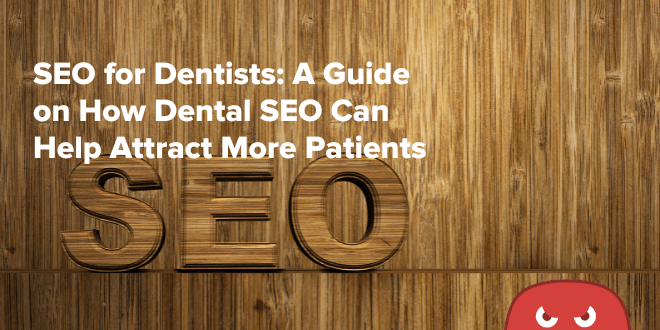



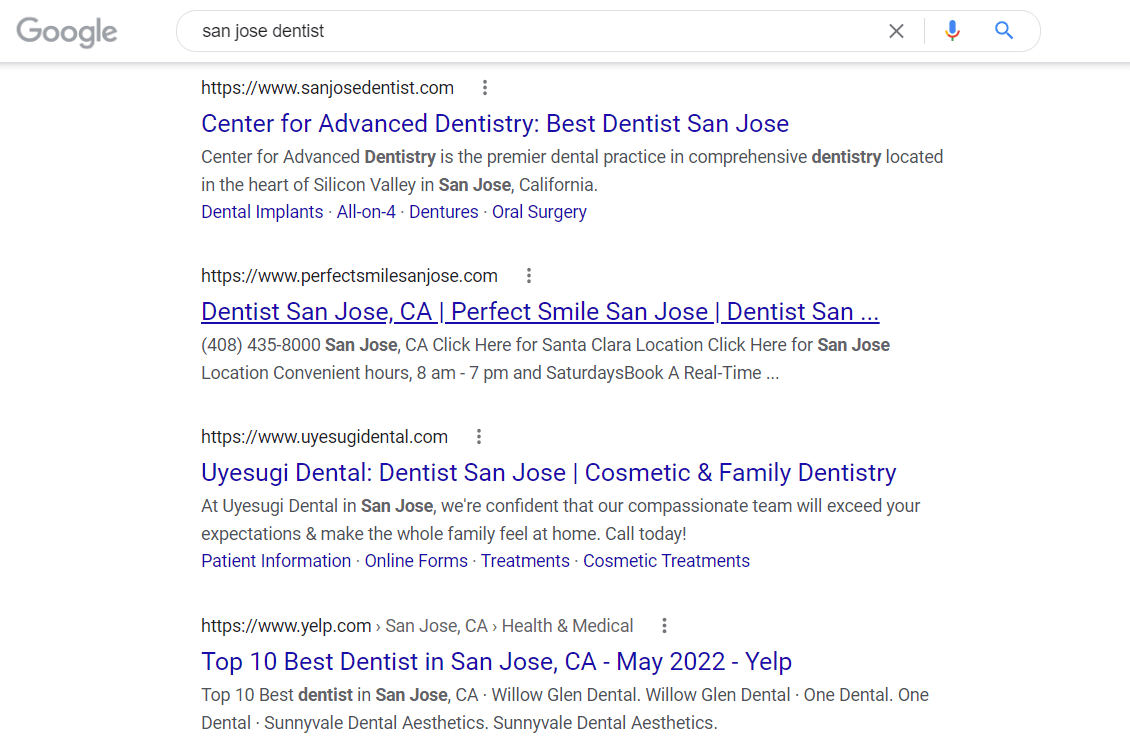
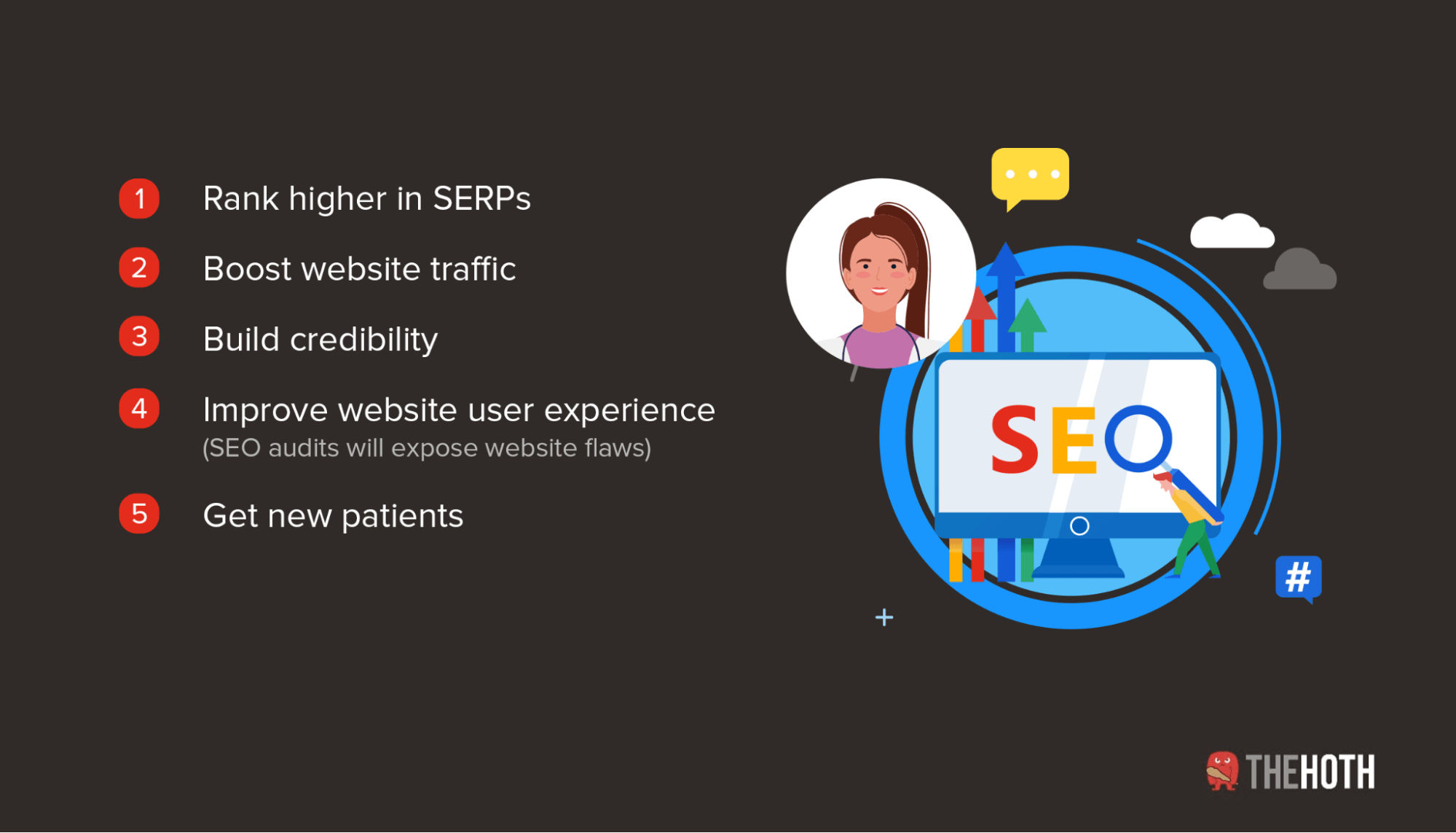

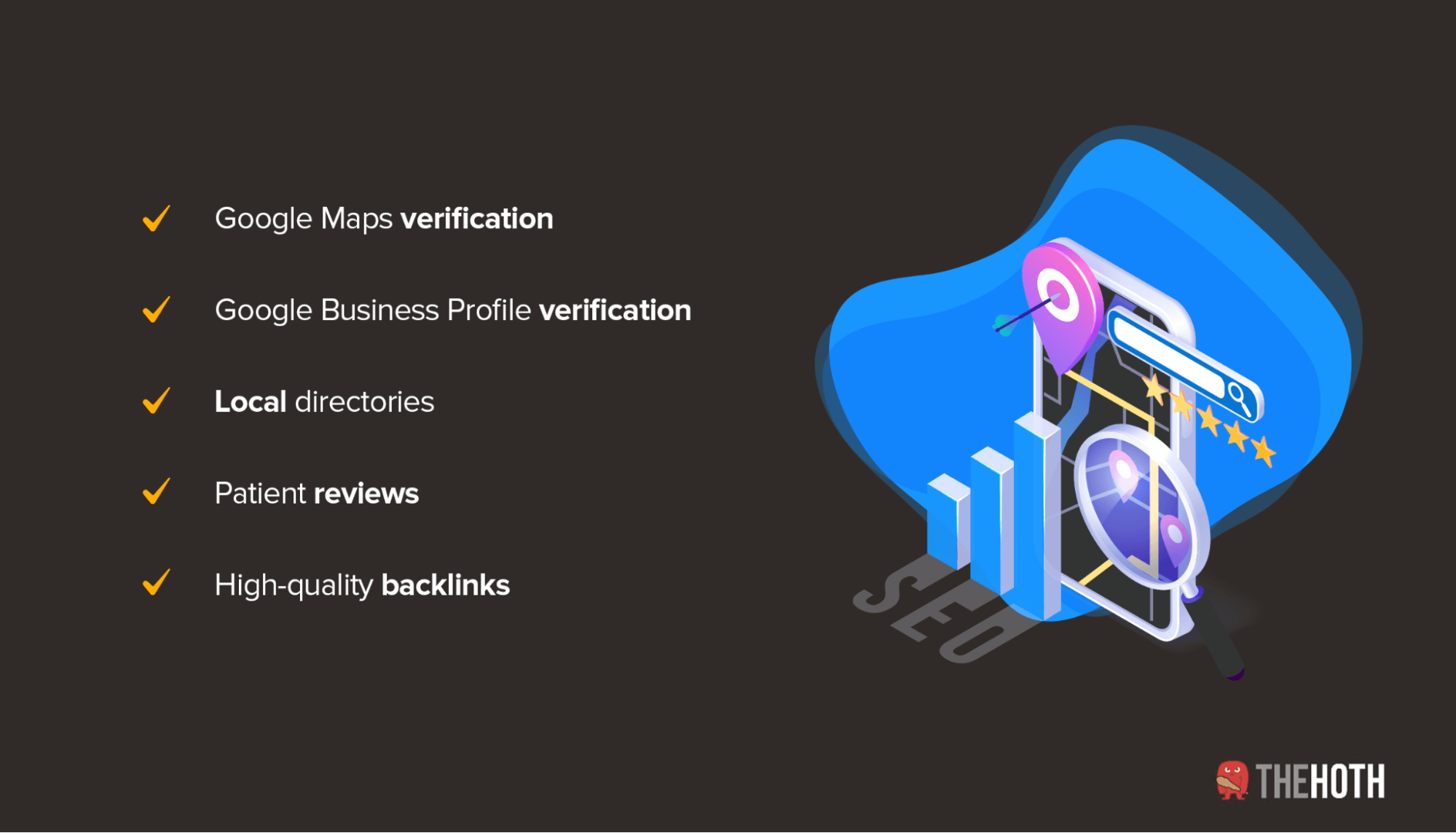
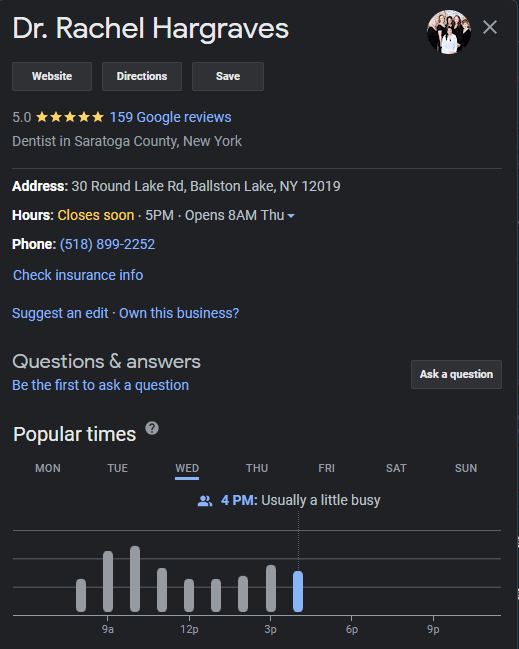



Good informative blog
SEO, especially in specialized fields like dentistry, is a marathon, not a sprint. The timeline you provided is realistic and aligns with industry expectations. While some niche keywords may yield quicker results, competitive and high-volume ones require consistent effort and patience.